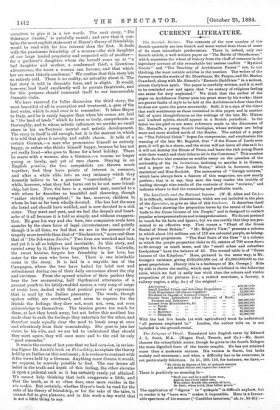CURRENT LITERATURE.
The Scottish Review. The contents of the new number of the Scotch quarterly axe less Scotch and more varied than those of some of its more immediate predecessors. There is, indeed, only one Scotch article, a well-written paper on "The Battle of Otterbourne," which separates the wheat of history from the chaff of romance in the legendary account of this remarkable bat useless conflict. "Mystical Novels" and "The Teaching of Archdeacon Farrar" are, to our thinking, the most notable articles in the number. The writer of the former treats the works of Mr. Shorthouse, Mr. Fergus, and Mr. Marion Crawford, along with Mr. Sinnett's "Esoteric Buddhism" in a serious, almost Carlylean spirit. The paper is carefully written, and it is well to be reminded now and again that "no ecstacy of religions feeling can atone for duty neglected." We think that the author of the paper on Archdeacon Farrar puts too great store by his works ; there are graver faults of style to be laid at the Archdeacon's door than that he does not quote the poets accurately. Still, it is a sign of the times that such sentiments as those contained in this paper, and in another full of quiet thoughtfulness on the writings of the late Mr. Hinton and kindred spirits, should appear in a Scotch periodical. In the latter we are glad to see some reference made to the discourses of Mr. Metcalfe, a young Scotch theologian, whose writings are being more and more studied north of the Border. The author of a paper on "The Political Crisis" hopes for compromise, and emphasises the warning of the late Mr. Bagehot, that "if the House of Lords ever goes, it will go in a storm, and the storm will not leave all else as it is ; it will not destroy the House of Peers, and leave the rich young Peers with their wealth and their titles to sit in the Commons." This number of the Review also contains an erudite essay on the question of the authorship of the De Imitations, inclining to ascribe it to Gerson, and a paper on "New South Wales," which is, however, rather statistical and Blue-Bookish. The summaries of "foreign reviews," which have always been a feature of this magazine, are now nearly perfect ; that is to say, they save the busy reader the trouble of wading through nine-tenths of the contents of these "reviews," and indicate where to find the remaining and profitable tenth.


































 Previous page
Previous page